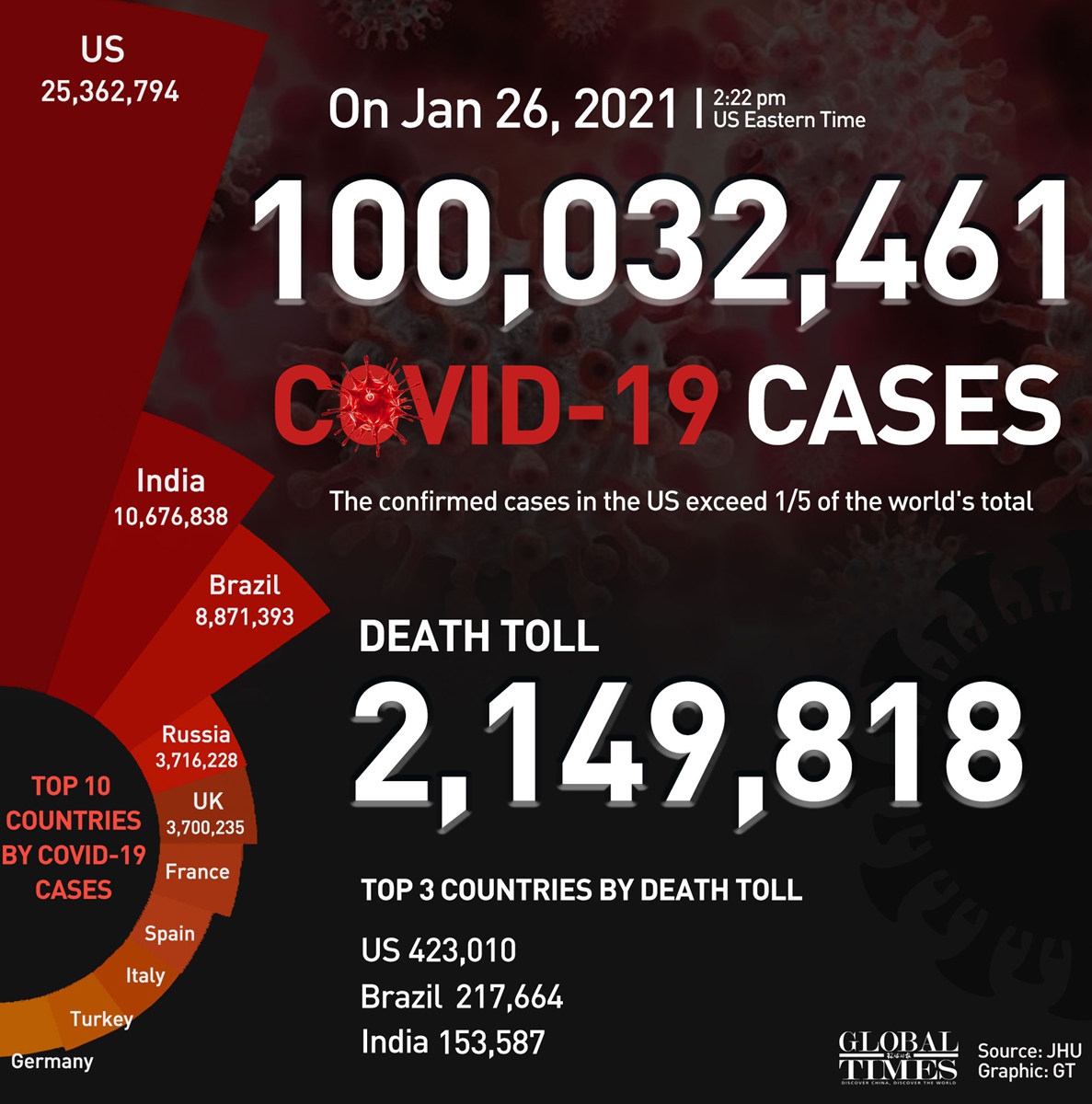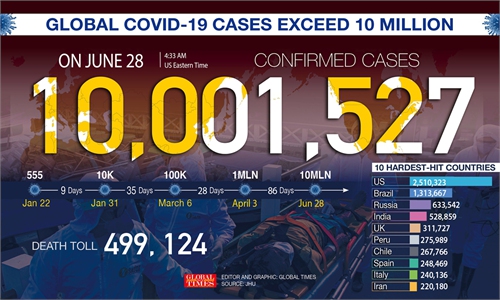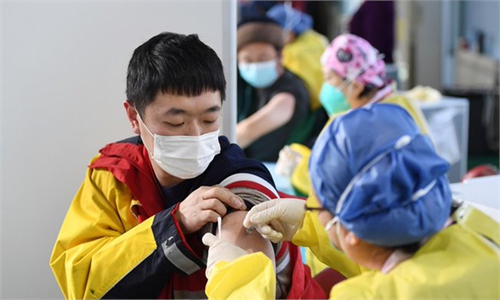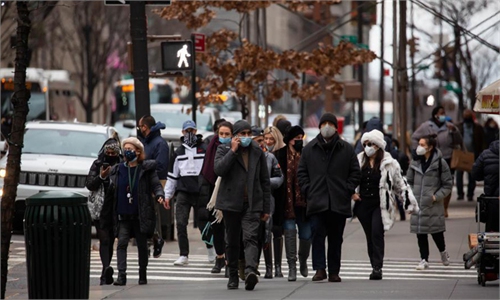Global coronavirus cases hit 100m, can humanity really learn from the apocalypse-like pandemic?

Global COVID-19 cases top 100 million: Johns Hopkins University. Graphic: GT
It's beyond anyone's imagination that the world would be living under the shadow of COVID-19 for so long when the virus pushed it to "hit the pause button". Now, almost a year after the WHO announced the emergency status at the end of January 2020, global confirmed cases have topped the 100 million mark, indicating that one person in 70 worldwide is infected with the coronavirus.
The year 2020 was also like a horrific Hollywood film depicting the apocalypse-like pandemic, which was the second-largest one over the past century following the Spanish flu that swept the world for two years. The COVID-19 pandemic, hitting 191 countries, has also reflected incompetence, flaws in international relations and failed global governance. Public health experts predict the COVID-19 pandemic could last four or five years. It makes unity and solidarity - which have been missed out and even ignored over the past year - much more important for the coming years.
Tedros Adhanom Ghebreyesus, Director General of the WHO, said at a press briefing on Monday that global coronavirus cases will reach 100 million this week. "This must strengthen our resolve to save lives," he said in a tweet.
As of Wednesday morning (Beijing time), global cases had surpassed 100 million, with the US, India and Brazil topping the list, according to data from Johns Hopkins University. The death toll has exceeded 2.14 million, with the US recording the highest at 423,010.
At the beginning of April, about two months after the WHO announced that the COVID-19 outbreak was a global health emergency on January 30, 2020, the number of confirmed coronavirus cases worldwide hit one million. Many countries had still not fully realized the magnitude of the pandemic, even though the WHO declared it as the first coronavirus to reach pandemic level less than a month earlier.
And two months later, the number of worldwide cases had passed 10 million, with over 500,000 deaths by the end of June.
Looking back at the year 2020, which many refer to as "a year of plague", some asked why countries such as the US, with the most advanced healthcare system but suffering the highest death toll, surpassing its World War II fatalities, failed to contain the virus spread.
Despite the WHO repeatedly calling for global unity and warning that the worst is ahead of us, the world saw global cases hitting the 100 million mark, marking another "milestone" prompting global leaders, officials, public health experts and ordinary citizens to reflect deeply on the essential failures in the global anti-epidemic battle.
How did the world get into this unprecedented situation and how deeply has the pandemic changed it? What lessons can be drawn from this global fight and what are the major flaws exposed in global governance? Who are the biggest winners and losers?
In his address at the World Economic Forum (WEF) Virtual Event of the Davos Agenda on Monday, Chinese President Xi Jinping said the pandemic is far from over, calling for scaling up the global solidarity in against this common challenge of all the countries.
'Golden opportunities' missed
Zeng Guang, chief epidemiologist at the Chinese Center for Disease Control and Prevention, told the Global Times on Monday that the key to controlling an infectious disease like COVID-19 is implementing measures as early as possible, and Western countries should have learnt from China's neighbors such as South Korea to take strict measures before January 30 when the WHO declared the global health emergency.
"Europe and the US acted late. It's so difficult to bring it under control when the fire is burning so big," Zeng said.
After the WHO declared the outbreak a global public health emergency on January 30, Europe began seeing outbreaks in some parts of Italy by the end of February following clusters of cases in places such as Lombardy and Piedmont. This was followed by other countries that reported coronavirus cases related to people who had traveled to the affected regions.
However, local authorities did not impose forceful travel restrictions or public health guidelines until the beginning of April, when the European Center for Disease Prevention and Control (ECDC) provided its expert opinion on the use of face masks, for example, which proved to be one effective way of reducing human-to-human transmission, given its nature as a highly transmissible respiratory disease.
The US government released a video urging the public to wear a mask only after Joe Biden took office, as his predecessor, Donald Trump, together with his allies, had rejected all the major public health measures, including mask-wearing and social distancing.
"After the WHO declared it a global public health emergency, countries cut off people-to-people exchanges at different levels, but authorities that imposed travel restrictions did not fully take into account the speed and the vast scale of the virus transmission," Chen Xi, an assistant professor of public health at Yale University, told the Global Times, noting that the policies made were not all based on scientific evidence.
Chen cited the US as an example, explaining that the decision not to cut contact with European countries became the source of the first wave of infections on the east coast of the US.
More importantly, rising anti-intellectualism, failed governance and politicizing the epidemic out of personal political interests all added up to an increasingly severe pandemic, resulting in the US recording the highest number of coronavirus cases and the highest death toll across the globe, and significantly hindered the global fight against the virus.
Besides the US, India and Brazil also had the largest number of global coronavirus cases. India surpassed Brazil in September 2020, with local authorities attributing the surge to an increase in daily testing. Despite the growing number of new cases, India decided to ease restrictions in order to open up its economy.
Some experts also saw lack of testing as another major flaw in the global fight against the pandemic, which was caused by insufficient understanding of the coronavirus and its characteristics in transmission, for example, through silent carriers.
Maria Van Kerkhove, the WHO's technical lead on the COVID-19 pandemic, said in June that the actual rates of asymptomatic transmission aren't yet known, after she said it was "very rare" for asymptomatic people to pass the disease on, drawing criticism from outside public health experts.
"It took a long time for us to understand it can indeed be passed on by asymptomatic people, and for a long time, we saw the shortfall in testing capability," Chen said.

A nurse administers the second dose of COVID-19 vaccine to a driver of the Shenzhen Bus Group Co., Ltd. at the health service center of the Xiameilin community in Futian District, Shenzhen, south China's Guangdong Province, Jan. 24, 2021. (Xinhua/Mao Siqian)
Vaccine-fueled hope in sight?
A recent independent report by the Switzerland-based Independent Panel for Pandemic Preparedness and Response (IPPPR) claimed that the WHO and China could have acted quicker and more forcefully to contain the start of the COVID-19 outbreak, and also highlighted the fact that the WHO did not declare the outbreak a pandemic until March 11, which was seen as a delayed act.
"It would be premature to comment on the interim IPPPR report before it has been discussed by the Member States. The WHO Director-General put together this panel, but it is independent and we would refer questions to them," WHO spokesperson Tarik Ja?arevi? told the Global Times via e-mail on Monday.
The magnitude of this pandemic, which has touched virtually everyone in the world, clearly deserves a commensurate evaluation, Tedros said in previous remarks.
Zeng from China's CDC said three more cities would have experienced the COVID-19 outbreak on the same scale as Wuhan if it had postponed its lockdown by one week, and 18 more cities would have the experience if Wuhan had postponed the lockdown for three weeks.
"From this point of view, Western countries wasted so much time to implement lockdowns and the world saw so many cities experience outbreaks like in Wuhan," he said.
Although the world has 100 millions of people infected with the virus, "vaccines are giving us hope," the head of the WHO said on Monday, while some experts predicted that there will be an inflection point of the pandemic through the combination of stricter prevention measures and mass inoculation.
Liang Manchun, an associate research fellow at the Institute for Public Safety Research of Tsinghua University, told the Global Times on Monday that the world is experiencing the coldest winter in the coronavirus pandemic, but will soon see an inflection point. "Global efforts such as mass vaccination campaigns and tightened measures will lead the world through the dark this year, and daily new global cases will see a significant drop," he said.
But for countries like the US, it is unlikely that there will be zero daily new cases by the end of this year due to its huge number of confirmed cases and measures that were taken too late, according to Liang.
The development and approval of safe and effective vaccines less than a year after the emergence of a new virus is a stunning scientific achievement, and a much-needed source of hope, Jašarević stressed.
As the first vaccines begin to be deployed, the promise of equitable access is at serious risk, but it will take time to vaccinate everyone against COVID-19, the spokesperson noted.
"In the meantime, we must continue to follow the tried and tested measures that keep each and all of us safe," he added.
The year of 2020 has passed, but the anti-epidemic battle is far from over, though mass vaccination has begun in some countries. The question about an equitable distribution still weighs on many, as human beings never lack lessons, but the biggest problem is the difficulty of learning lessons, according to observers.
And for many who expressed goodwill for a changing 2021 when the world tries hard to emerge from the shadow of the pandemic, it is also highly expected that it won't repeat flaws, differences, selfishness, and confrontation that were witnessed in the past year. As Xi said, "Closer solidarity and cooperation, more information sharing, and a stronger global response are what we need to defeat COVID-19" at the WEF Virtual Event of the Davos Agenda.

From 0 to 100,000,000, how COVID-19 pandemic compares to other outbreaks in the past 100 years. Graphic: GT





